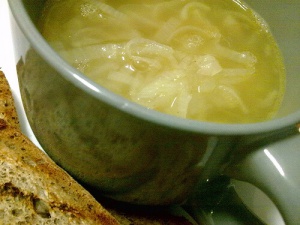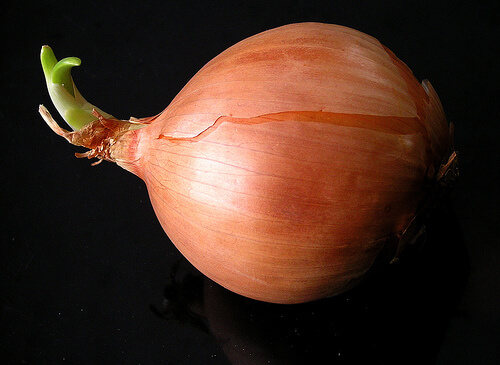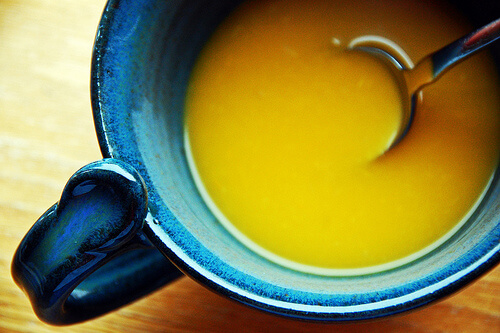Onion Soup for Your Kidneys

Onions are one of the greatest medicinal foods. With highly depurative, antiseptic, and diuretic properties, they’re ideal remedies to fight any kind of kidney-related problem like urinary infections, kidney stones, fluid retention, etc.
Read on to discover a 9-day kidney cleanse involving onion soup. You’ll see results right away and your kidneys will thank you for it.
Properties of onions
Onions are rich in minerals like calcium, magnesium, copper, iron, phosphorus, iodine, silicon, and sulfur. They also contain vitamins A, B, C, and E. These values give it the following health properties:
- They’re diuretic, which is why they can treat fluid retention, swollen eyelids, edemas, etc.
- Fight inflammation.
- They’re huge antioxidants.
- They’re antiseptic, antimicrobial, and anti-fungal. This means they help fight infections caused by bacteria, microbes, and fungus.
- Improve breathing.
- Protect you from cardiovascular diseases.

How to make onion soup
To make onion soup, boil one onion per liter of water. As an option, you can add parsley sprigs along with the onions, which will also help cleanse your kidneys deeply.
Drink the soup made with two liters of water and two onions every day. You can make more and store it in the fridge for a maximum of two to three days.

How to eat it
Eat the soup in small sips throughout the day, at room temperature if possible. If you like, you can add a little bit of lemon juice to it.
It’s highly recommended that you consume at least two glasses of onion soup on an empty stomach at least half an hour before breakfast. Try to consume the soup every day before midday so you don’t have to go to the bathroom at night.
The 9-day cure
The depurative kidney cure that we recommend lasts nine days. Along with consuming the soup, follow these suggestions:
- Try to cut your salt and salty food intake. You can add salt to your meals with a little bit of salt water (sold in natural product shops and some supermarkets).
- Reduce your consumption of animal proteins (especially meat, milk, and dairy products) and prioritize vegetable proteins. Adzuki beans are excellent for your kidneys. Other sources of vegetable protein besides legumes are dried fruits and mushrooms. You can also eat eggs and a little bit of fish.
- Avoid refined sugar and sugary foods. Use honey or stevia to sweeten.
- Kidneys, along with the liver, are the main organs that tend to get cold and worsen kidney diseases and also cause a lack of energy, fatigue, and pains in the lumbar region. In order to prevent this, always keep the middle and lower area of your back warm. At night, you can put a hot compress on it.
- If you do physical activity and you sweat, this will help loosen your kidneys. By overworking them, you help your body eliminate fluids.
An example of a healthy daily meal plan
Here’s an example of a daily healthy meal plan:
- On an empty stomach: two or three sips of soup.
- Breakfast: whole wheat toast and an omelette.
- Mid-morning: dried fruits.
- Lunch: lentil soup and whole rice, a salad, and apple preserve sweetened with honey.
- Mid-afternoon: a few bowls of soup.
- Snack: a banana and cranberry smoothie.
- Dinner: cabbage with potatoes, stir-fry with garlic, and fish fillet.
Read on: Make an Infusion from this Plant and Clean your Kidneys
A warning
Although some people don’t digest raw onion well, they may digest cooked onion. We recommend trying this onion soup recipe with caution. If there are symptoms of indigestion, discontinue the cleanse.
Images courtesy of looseends, lablascovegmenu, and muffet.
All cited sources were thoroughly reviewed by our team to ensure their quality, reliability, currency, and validity. The bibliography of this article was considered reliable and of academic or scientific accuracy.
- Roldán, E., Sánchez-Moreno, C., de Ancos, B., & Cano, M. P. (2008). Characterisation of onion (Allium cepa L.) by-products as food ingredients with antioxidant and antibrowning properties. Food Chemistry. https://doi.org/10.1016/j.foodchem.2007.11.058
- Griffiths, G., Trueman, L., Crowther, T., Thomas, B., & Smith, B. (2002). Onions – A global benefit to health. Phytotherapy Research. https://doi.org/10.1002/ptr.1222
- Lanzotti, V. (2006). The analysis of onion and garlic. Journal of Chromatography A. https://doi.org/10.1016/j.chroma.2005.12.016
This text is provided for informational purposes only and does not replace consultation with a professional. If in doubt, consult your specialist.








